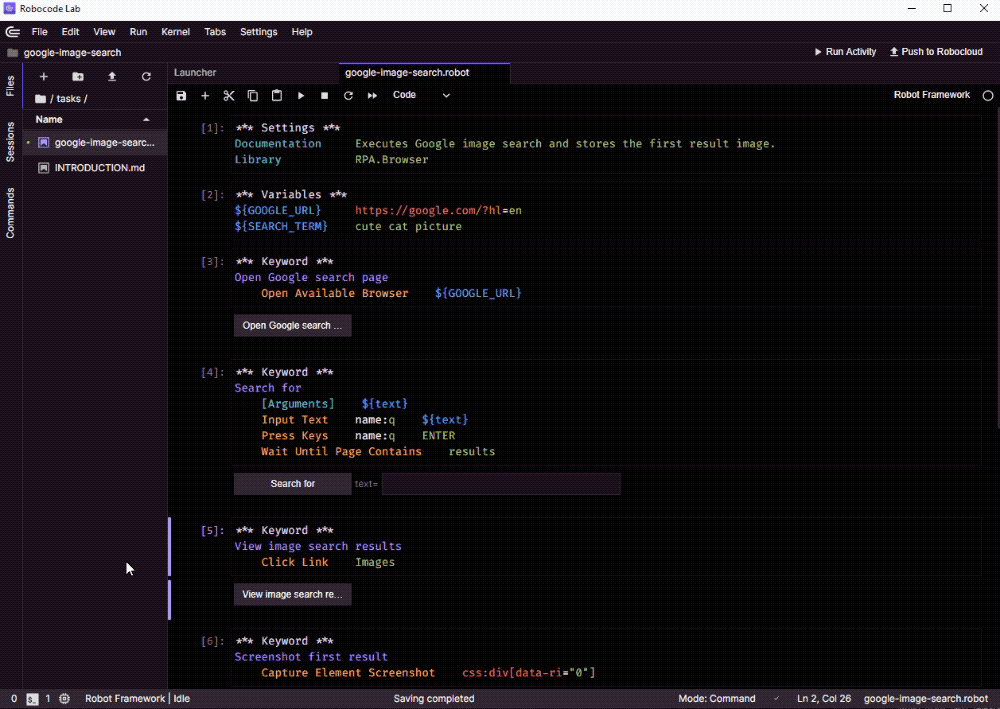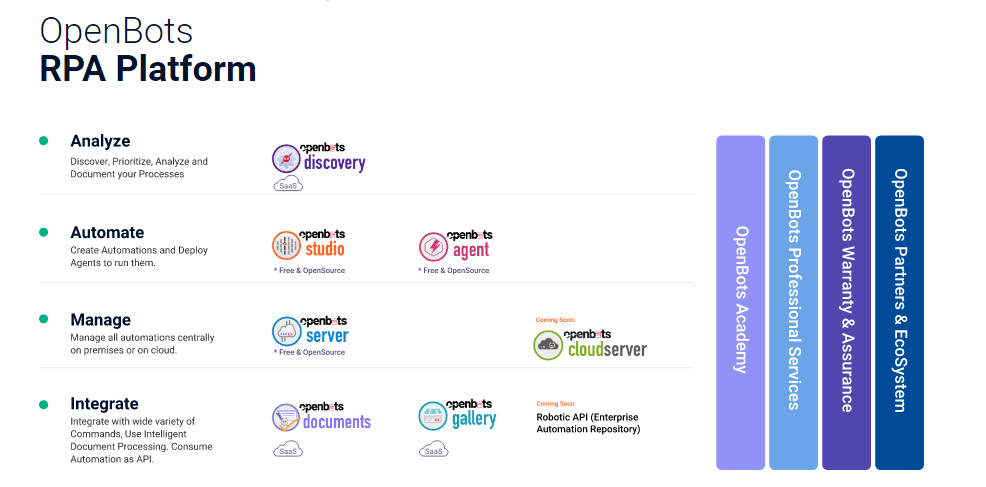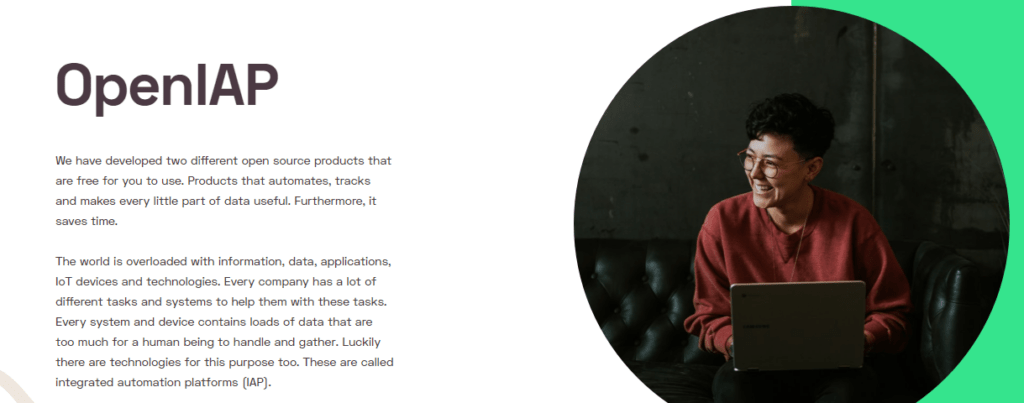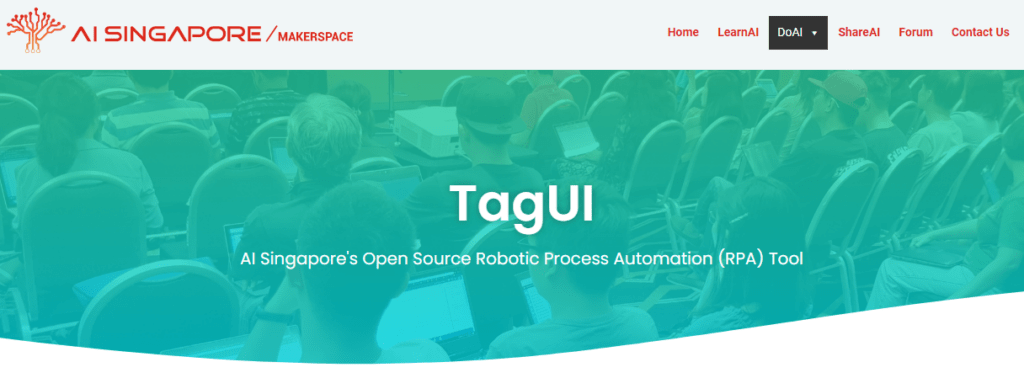This guide covers the top open-source RPA tools available right now. (Updated: March 2021).
The objective is to give you a sense of the proven open-source automation tools. For each of the tools, we will dive deeper into their key features, technologies used, and business models. We will also link to some of the important resources you can use for the tools.
The RPA tools space is evolving rapidly and this guide will endeavor to keep you up to date on the promising open-source RPA options.
Let us start with what you essentially need to know about open-source RPA right now.
Basics of Open-source RPA
While RPA has taken the software space by storm, we have seen that pricing or licensing costs are hampering their widespread acceptance. Open-source options can alleviate some of that. Here are some distinct advantages of using open-source RPA.
Advantages
- Fewer business-case restrictions: With no upfront costs and comparatively lower support costs, you can justify going after more automation use cases.
- Innovation possibilities: With open-source, you have access to the codebase. You are free to combine with other open-source tools or even build on top of these tools for your specific needs.
- No lock-in risk: Proprietary RPA could increase your risk of being locked into the vendor and/or their technology. While rare, you could end up at the mercy of their price increases and lack of flexibility.
Having said that, here are things you need to know about open-source RPA tools even before you start.
Challenges
- Though they have come a long way, the tools are still maturing. They do not have the expansive features and ease-of-use of the commercial counterparts.
- The open-source tools usually need more technical know-how and may even need you to code the workflows. They are generally built by developers for developers though there are exceptions.
- Each Open-source tool comes with different business models and licenses. You may want to read through and understand which parts are paid and how it impacts your business case.
Open-source though is becoming the norm in many large enterprises. Generally, as the technology matures, we see more compelling open-source options that could even overtake the mainstream technologies (eg. Android, Linux, etc.). This could very well be the future of RPA!
So, it makes sense to keep abreast of what is happening in this space.
Before we start, would you like to have a quick demo of all the top open-source RPA tools? If so, here is a playlist that takes you through the tools. (You can switch between videos using the top right Playlist icon)
Hope you got a quick visual of the tools with the demos.
Let us now explore the tools in detail. Click on the links to dive deeper into each open-source RPA tool.
Option 1: Robocorp
Are you a developer or have a team of developers? Like to have more power vs drag-drop?
Robocorp is a Python-based Automation stack.
It was originally built on top of another popular open-source framework – Robot Framework. They are now pivoting to more of a Python-based stack.

Robocorp is the most funded open-source RPA and has a great team behind it.
Read more about Robocorp here.
Option 2: OpenBots
Are you looking for a low-code open source alternative? Do you like capabilities like Process discovery?
OpenBots is a Low-code automation platform with a suite of products to support you.
Built on the lines of top commercial products like Automation Anywhere, it uses Taskt as the base. The platform is simple yet pretty comprehensive.

It uses a generic RPA architecture with a Studio, a Server and a Runtime.
Read more about OpenBots here.
Option 3: Open RPA
Do you already have experience on UiPath? Would you like to add larger BPM or workflow capabilities?
Open RPA is an open-source tool with a drag-drop interface like the popular RPA UiPath.
You can combine with OpenFlow to orchestrate automation made with Open RPA. OpenFlow integrates with the event-based workflow engine NodeRED to enable automation beyond RPA.

With OpenFlow, Open RPA supports Security, Scheduling, Central management, Remote management, and handling of state.
Read more about Open RPA here.
Option 4: Tag UI
Are you looking for a bare-bones automation for tasks? Do you develop or have a team of coders?
TagUI is an open-source RPA maintained by AI Singapore, a government-funded initiative.
TagUI uses “human language” like Command line syntax to build your automation. You can also do screen-based automation for websites and desktops using integration with Sikuli.

You can even code your automation in Python with TagUI.
Open Source RPA Tools – Looking ahead
There is huge potential with Open Source RPA. The best part about Open source RPA tools is that it creates an open framework for you to combine different tools to innovate.
With $0 bots, you are able to focus on even the smaller benefits and not spend time justifying costly licenses.
The open-source RPA tools are slowly and steadily becoming a viable option.
Appreciate your comments and feedback!
If you like this, you may like the Complete Guide to Robotic Process Automation [RPA].

Thanks Nandan,
Nice, neat & captive article. Now you got me into RPA world.
Thanks Nandan, for such an informative article.
I do automate all my task through a very powerful, open source scripting language called AutoIt.
Autoitscript.com
Thanks Hemal. Auto it script is interesting. Can you share some interesting automations you have done?
Something valuable on RPA after a long time, thanks ..
Hi Nandan, this is great. Thank you for collecting the information and sharing it here. I have few questions on the difference between these open-source tools, I’ll reach out to you separately.
Thanks again!
Very good info. While Opensource RPA is good for many reasons, main selling point I see is the low risk in trying out POC with multiple products in an enterprise setting.
Good point, Mathew. Thanks for sharing.